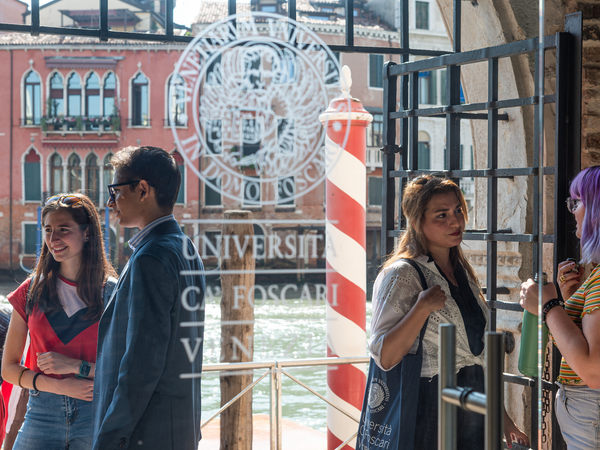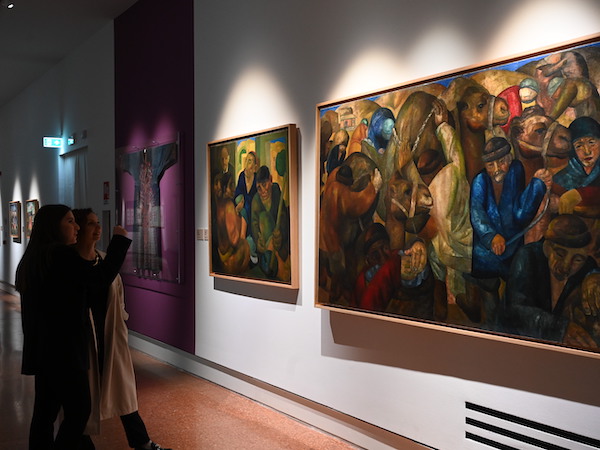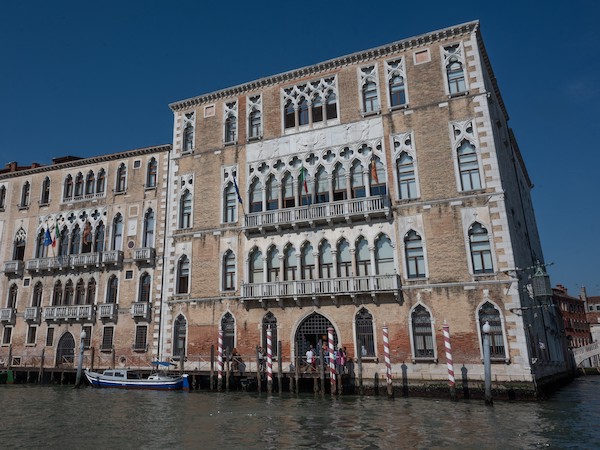How has the pandemic affected the European system of governance? What role have European cities played in facing this health crisis and its social and economic effects? In what way has the pandemic influenced the relationship among local, regional and national authorities? These are some of the central topics of the Multi-level governance in Europe: the case of Covid-19 pandemics International Conference which was held on 9 and 10 May 2022 at Ca’ Foscari (Aula Baratto). The conference was opened by Giuseppe Conte, professor and ex Prime Minister of Italy.
We have interviewed Stefano Soriani, an expert in economic and political geography and co-organiser of the event together with Jan Zielonka (Ca’ Foscari University of Venice and Horizon EU3D) and John Erik Fossum (ARENA, University of Oslo and Horizon EU3D).
Although the pandemic has been a global phenomenon, its impact has varied greatly. In what way?
The pandemic has highlighted the ways in which human societies are inextricably linked in a “global web of life”, as well as the fallacy of the modern belief that we can manage impermeable borders. Although the pandemic has been a global phenomenon, it has had different impacts depending on a series of factors. These include individual factors (such as health conditions, i.e. high blood pressure, obesity, diabetes, chronic respiratory conditions, etc.) which have played a key role in determining mortality rates, as well as demographic factors (the elderly were affected more than younger people), socio-economic (poor people were more easily affected), geographical (the pandemic affected urban areas more than rural ones). On the other hand, the connection between the pandemic and environmental conditions, and air quality in particular, is less clear.
A crucial factor was the quality of the healthcare system and in particular the existence of “local” health services. The geographical nature of welfare policies became evident. The pandemic also highlighted the importance of local, national and international institutions and the degree of trust that citizens feel towards such institutions (and in particular towards local and national ones).
What impact has the pandemic had on European politics?
In this case, too, the pandemic has had different effects which in some cases are seemingly contradictory. For example, the Schengen agreement was suspended and many countries decided to block the exportation of goods they considered to be strategic when facing the epidemic (such as personal protective equipment). This seemed to fuel the idea (which was indeed an illusion) that borders could be used to protect citizens against the virus.
On the other hand, Europe played a key role in vaccination politics and in giving economic support to the people most affected by the situation (such as those employed in the non-essential services sector and in transport). Moreover, in order to hinder the economic crisis the European Union has finally adopted financial tools that were unimaginable just a few years ago, aiming to create a common debt.
The pandemic also confirmed the economic and human costs deriving from the lack of policies adequately coordinated within the EU. The so-called cost of non-Europe was high, especially with regard to the management of “creeping crises” such as the pandemic. This can be attributed to the fact that states are reluctant to concede increasing quotas of sovereignty to the European Commission. It may also be argued that states are not inclined to tackle the structural limitations of European design, or at least of its most ambitious goals.
What are the most important effects of the pandemic from a broad political perspective?
The pandemic has accelerated already-existing tendencies and highlighted issues that have been discussed in social sciences during the last few decades.
In general, the pandemic has reinforced the tendency to centralise power on a national scale and to reduce democratic space on different levels. It is absolutely clear that the pandemic has reduced the scope for democratic practice due to the use of emergency policies. The introduction of the green pass and the development of health surveillance systems have been crucial instruments in fighting the pandemic and facilitating the re-establishment of previous conditions (especially from an economic perspective. However, these systems have also strengthened the bio-political nature of governmental activities — something which has been noted and criticised, as well as trivialised by populist rhetoric.
Moreover, every European democratic system was subjected to considerable stress among the levels of government. Governments needed to make decisions very quickly and manage the closing and opening of activities, especially in countries in which the pandemic spread more in some geographical areas than in others and nn which political opposition hindered the relationship between national governments and local administration (regions, provinces, cities, etc.).
The pandemic has reinforced the tendency to centralise political choices — a tendency that was already evident in the past few years following the crisis of the Eurozone, especially in countries with a crippling public debt, such as Italy. The pandemic has caused national governments to manage great sums of money, and this has, in a certain way, redefined the playing field for local governance, which was suddenly far more dependent on national policies than it had been in previous years, when the primacy of local governments was unquestioned.
The role of scientists and experts in the context of the pandemic has also been discussed.
The pandemic has highlighted the role of scientists and experts. This was particularly true during the initial phases of the pandemic, when the health policies of various countries were attempting to “follow the science”.
As the pandemic started to become “the new normal”, health politics often wavered under the political pressure and an increasingly restless public opinion, as well as because of the economic effects of lockdowns. At the same time, the complexity of the relationship between science and the media has often exacerbated the scepticism about scientists and experts, facilitating the spreading of “conspiracy” feelings which are typical of the post-truth era and are often amplified by transnational webs that aim to unhinge democratic systems.
However, we must not forget that through cooperation on a global scale and huge public investments that reduced the risk of private investors, the world of science and research made incredible progress in very little time — consider, for example, the development of mRNA vaccines. At the same time, the European experience shows that when we consider the ways in which “technical-scientific systems” work, we must also consider the social and cultural context they operate in. From this point of view, the pandemic has shown that the mediating role of scientists and experts with citizens and governments is extremely delicate, and that it is affected not only by the uncertainty of scientific progress but also by the tendency to spectacularise science and expert opinions.
Is it true that the pandemic has highlighted the fragility of globalisation?
From some points of view it has, from others it has not. We must draw a line between the criticism of globalisation as a complex phenomenon and the criticism of globalisation that amounts to stereotypical and a-critical narratives.
It is one thing to develop a critical thought on globalisation and to understand its intrinsic contradictions. It is another to criticise stereotypical views on globalisation.
The pandemic has certainly had an impact on travel and on the tourism industry. It has had an impact on international commerce and foreign investments. It has created a general perception that “nothing will be the same as before”, undermining mainstream narratives related to a “triumphal” view of neoliberal globalisation — narratives which celebrated the benefits of globalisation while ignoring the other side of the coin (inequality, global environmental problems, the spreading of cultural stereotypes, etc.).
At the same time, the pandemic has accentuated the digital nature of our activities and our personal and social lives within the global dimension that we inevitably live our lives in. This digital nature is a key feature of globalisation, and its consequences on our cities and on the way we organise our time at work and at home are yet to be fully explored.
Globalisation is not a linear process — it feeds on socio-economic and territorial imbalances that are not (as we might be led to believe) the consequences of globalisation, but its driving forces. The pandemic has highlighted the contradictions of globalisation, the friction that marks its development, and the difficulty in governing or steering it towards more balanced pathways of social and environmental development.
The pandemic attracted attention to the way in which globalisation has (or has not) been managed in the last few decades, at least since the end of the Cold War and the start of the growth of “peripheral” economies that have reshaped contemporary economic (dis)order.
We must bear in mind that the pandemic “stressed” relationships among citizens, economic sectors and government levels, thereby shifting our focus to social conflict and to the ways in which democratic governments can manage it.
Let’s talk about the role that cities played during the pandemic as a fundamental level of government.
In the last few years, social science has highlighted the essential economic and political role that cities play, especially in great metropolitan areas — but also in polycentric metropolitan areas which are typical in Europe.
A great part of the population lives in cities. Cities attract foreign investments and host multinational corporations and international organisations. They are hubs for the contemporary connectivity that shapes globalisation processes — albeit in non-linear and not always predictable ways.
At the same time, cities are increasingly connected one to another and create webs in which economic, financial and political power can accumulate. Cities are also fundamental players in transnational webs and they are spaces in which we can witness the opportunities and the contradictions of globalisation (such as the concentration of wealth, social exclusion, inequality, issues and opportunities related to migration).
Cities are places in which people elaborate political strategies and they play a role in redefining the concept of sovereignty. The power of the nation-state has been progressively eroded “from above” — from global finance, climate change, international organisations and transnational webs, including criminal ones — and “from the bottom” (the rise of the new social movements of active citizen dynamics). This means that in the development of contemporary governance systems the role of cities is becoming more important. This is also true from an international perspective, as shown by widespread adoption of approaches and tools related to so-called city diplomacy.
How did the pandemic become involved in these dynamics? What can be said about Italy?
There is no single answer to this question, since much depends on the way different levels of government are structured — and this varies from country to country. The role of governments has been fundamental. In any case, during the different phases of the pandemic the pendulum moved back and forth between two extremes: that of cooperation and research, on the one hand, and that of conflict on the other. We cannot give a single answer because the different institutional traits of different contexts make national contexts very different from each other. The responses to the pandemic have been top-down and bottom-up — in Italy, as well.
In our case, different regions responded in different ways, some of them in ways that were more attentive to the relationship with the national government (especially when requesting economic support or specific provisions for the regional context), while others were better at using local resources.
Cities and regions have often asserted their role when pressuring for the “return to normality”, leaving it up to national governments to “close”. Sometimes, cities and regions promoted even stricter measures to manage the pandemic, and their approaches were eventually adopted on a national level.
In any case, cities have been a first “defence line” against the health problems and social-economic problems caused by the pandemic. They acted as “labs” for processes of organisational innovation which involved state bodies, private companies, and third-sector organisations.
What is the legacy of this pandemic when it comes to governance?
The pandemic — which is not over yet — has changed our perception of the world, which now seems less predictable, with greater inequality. We are aware that the “global risk society” is an essential part of our personal and social experience. We are aware of the challenge — or perhaps of the impossibility — of finding a balance among global dynamics and the increasing need for security.
Despite hyper globalist narratives, national governments remain fundamental for the management of emergencies and for the planning of a new normality. In addition, local contexts and resources play a fundamental role in the process of organisational and institutional innovation. Cooperation between public and private actors — horizontally and vertically — and a greater coordination of public policies on a national and European level are fundamental tools in the management of the issues caused by pandemics and conflicts.
Finally, we must remember that the topic of governance in its varying forms involves greater issues, such as the relationship between science and society, privacy and data management, democracy and security.











